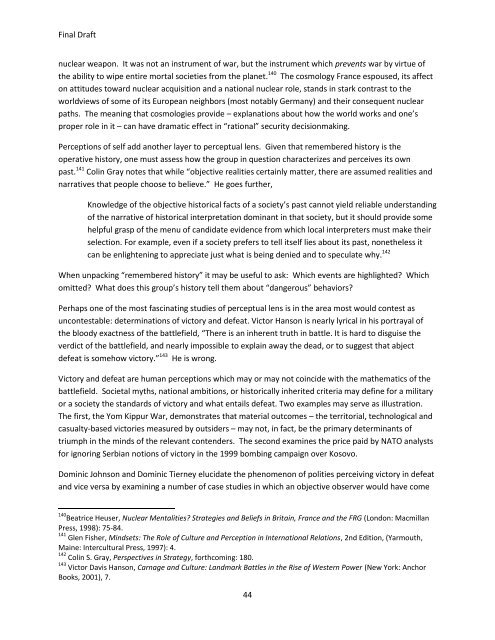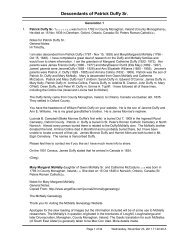Assessing the Strategic Impact of Service Culture on ...
Assessing the Strategic Impact of Service Culture on ...
Assessing the Strategic Impact of Service Culture on ...
Create successful ePaper yourself
Turn your PDF publications into a flip-book with our unique Google optimized e-Paper software.
Final Draft<br />
nuclear weap<strong>on</strong>. It was not an instrument <str<strong>on</strong>g>of</str<strong>on</strong>g> war, but <str<strong>on</strong>g>the</str<strong>on</strong>g> instrument which prevents war by virtue <str<strong>on</strong>g>of</str<strong>on</strong>g><br />
<str<strong>on</strong>g>the</str<strong>on</strong>g> ability to wipe entire mortal societies from <str<strong>on</strong>g>the</str<strong>on</strong>g> planet. 140 The cosmology France espoused, its affect<br />
<strong>on</strong> attitudes toward nuclear acquisiti<strong>on</strong> and a nati<strong>on</strong>al nuclear role, stands in stark c<strong>on</strong>trast to <str<strong>on</strong>g>the</str<strong>on</strong>g><br />
worldviews <str<strong>on</strong>g>of</str<strong>on</strong>g> some <str<strong>on</strong>g>of</str<strong>on</strong>g> its European neighbors (most notably Germany) and <str<strong>on</strong>g>the</str<strong>on</strong>g>ir c<strong>on</strong>sequent nuclear<br />
paths. The meaning that cosmologies provide – explanati<strong>on</strong>s about how <str<strong>on</strong>g>the</str<strong>on</strong>g> world works and <strong>on</strong>e’s<br />
proper role in it – can have dramatic effect in “rati<strong>on</strong>al” security decisi<strong>on</strong>making.<br />
Percepti<strong>on</strong>s <str<strong>on</strong>g>of</str<strong>on</strong>g> self add ano<str<strong>on</strong>g>the</str<strong>on</strong>g>r layer to perceptual lens. Given that remembered history is <str<strong>on</strong>g>the</str<strong>on</strong>g><br />
operative history, <strong>on</strong>e must assess how <str<strong>on</strong>g>the</str<strong>on</strong>g> group in questi<strong>on</strong> characterizes and perceives its own<br />
past. 141 Colin Gray notes that while “objective realities certainly matter, <str<strong>on</strong>g>the</str<strong>on</strong>g>re are assumed realities and<br />
narratives that people choose to believe.” He goes fur<str<strong>on</strong>g>the</str<strong>on</strong>g>r,<br />
Knowledge <str<strong>on</strong>g>of</str<strong>on</strong>g> <str<strong>on</strong>g>the</str<strong>on</strong>g> objective historical facts <str<strong>on</strong>g>of</str<strong>on</strong>g> a society’s past cannot yield reliable understanding<br />
<str<strong>on</strong>g>of</str<strong>on</strong>g> <str<strong>on</strong>g>the</str<strong>on</strong>g> narrative <str<strong>on</strong>g>of</str<strong>on</strong>g> historical interpretati<strong>on</strong> dominant in that society, but it should provide some<br />
helpful grasp <str<strong>on</strong>g>of</str<strong>on</strong>g> <str<strong>on</strong>g>the</str<strong>on</strong>g> menu <str<strong>on</strong>g>of</str<strong>on</strong>g> candidate evidence from which local interpreters must make <str<strong>on</strong>g>the</str<strong>on</strong>g>ir<br />
selecti<strong>on</strong>. For example, even if a society prefers to tell itself lies about its past, n<strong>on</strong>e<str<strong>on</strong>g>the</str<strong>on</strong>g>less it<br />
can be enlightening to appreciate just what is being denied and to speculate why. 142<br />
When unpacking “remembered history” it may be useful to ask: Which events are highlighted? Which<br />
omitted? What does this group’s history tell <str<strong>on</strong>g>the</str<strong>on</strong>g>m about “dangerous” behaviors?<br />
Perhaps <strong>on</strong>e <str<strong>on</strong>g>of</str<strong>on</strong>g> <str<strong>on</strong>g>the</str<strong>on</strong>g> most fascinating studies <str<strong>on</strong>g>of</str<strong>on</strong>g> perceptual lens is in <str<strong>on</strong>g>the</str<strong>on</strong>g> area most would c<strong>on</strong>test as<br />
unc<strong>on</strong>testable: determinati<strong>on</strong>s <str<strong>on</strong>g>of</str<strong>on</strong>g> victory and defeat. Victor Hans<strong>on</strong> is nearly lyrical in his portrayal <str<strong>on</strong>g>of</str<strong>on</strong>g><br />
<str<strong>on</strong>g>the</str<strong>on</strong>g> bloody exactness <str<strong>on</strong>g>of</str<strong>on</strong>g> <str<strong>on</strong>g>the</str<strong>on</strong>g> battlefield, “There is an inherent truth in battle. It is hard to disguise <str<strong>on</strong>g>the</str<strong>on</strong>g><br />
verdict <str<strong>on</strong>g>of</str<strong>on</strong>g> <str<strong>on</strong>g>the</str<strong>on</strong>g> battlefield, and nearly impossible to explain away <str<strong>on</strong>g>the</str<strong>on</strong>g> dead, or to suggest that abject<br />
defeat is somehow victory.” 143 He is wr<strong>on</strong>g.<br />
Victory and defeat are human percepti<strong>on</strong>s which may or may not coincide with <str<strong>on</strong>g>the</str<strong>on</strong>g> ma<str<strong>on</strong>g>the</str<strong>on</strong>g>matics <str<strong>on</strong>g>of</str<strong>on</strong>g> <str<strong>on</strong>g>the</str<strong>on</strong>g><br />
battlefield. Societal myths, nati<strong>on</strong>al ambiti<strong>on</strong>s, or historically inherited criteria may define for a military<br />
or a society <str<strong>on</strong>g>the</str<strong>on</strong>g> standards <str<strong>on</strong>g>of</str<strong>on</strong>g> victory and what entails defeat. Two examples may serve as illustrati<strong>on</strong>.<br />
The first, <str<strong>on</strong>g>the</str<strong>on</strong>g> Yom Kippur War, dem<strong>on</strong>strates that material outcomes – <str<strong>on</strong>g>the</str<strong>on</strong>g> territorial, technological and<br />
casualty-based victories measured by outsiders – may not, in fact, be <str<strong>on</strong>g>the</str<strong>on</strong>g> primary determinants <str<strong>on</strong>g>of</str<strong>on</strong>g><br />
triumph in <str<strong>on</strong>g>the</str<strong>on</strong>g> minds <str<strong>on</strong>g>of</str<strong>on</strong>g> <str<strong>on</strong>g>the</str<strong>on</strong>g> relevant c<strong>on</strong>tenders. The sec<strong>on</strong>d examines <str<strong>on</strong>g>the</str<strong>on</strong>g> price paid by NATO analysts<br />
for ignoring Serbian noti<strong>on</strong>s <str<strong>on</strong>g>of</str<strong>on</strong>g> victory in <str<strong>on</strong>g>the</str<strong>on</strong>g> 1999 bombing campaign over Kosovo.<br />
Dominic Johns<strong>on</strong> and Dominic Tierney elucidate <str<strong>on</strong>g>the</str<strong>on</strong>g> phenomen<strong>on</strong> <str<strong>on</strong>g>of</str<strong>on</strong>g> polities perceiving victory in defeat<br />
and vice versa by examining a number <str<strong>on</strong>g>of</str<strong>on</strong>g> case studies in which an objective observer would have come<br />
140<br />
Beatrice Heuser, Nuclear Mentalities? Strategies and Beliefs in Britain, France and <str<strong>on</strong>g>the</str<strong>on</strong>g> FRG (L<strong>on</strong>d<strong>on</strong>: Macmillan<br />
Press, 1998): 75-84.<br />
141<br />
Glen Fisher, Mindsets: The Role <str<strong>on</strong>g>of</str<strong>on</strong>g> <str<strong>on</strong>g>Culture</str<strong>on</strong>g> and Percepti<strong>on</strong> in Internati<strong>on</strong>al Relati<strong>on</strong>s, 2nd Editi<strong>on</strong>, (Yarmouth,<br />
Maine: Intercultural Press, 1997): 4.<br />
142<br />
Colin S. Gray, Perspectives in Strategy, forthcoming: 180.<br />
143<br />
Victor Davis Hans<strong>on</strong>, Carnage and <str<strong>on</strong>g>Culture</str<strong>on</strong>g>: Landmark Battles in <str<strong>on</strong>g>the</str<strong>on</strong>g> Rise <str<strong>on</strong>g>of</str<strong>on</strong>g> Western Power (New York: Anchor<br />
Books, 2001), 7.<br />
44

















